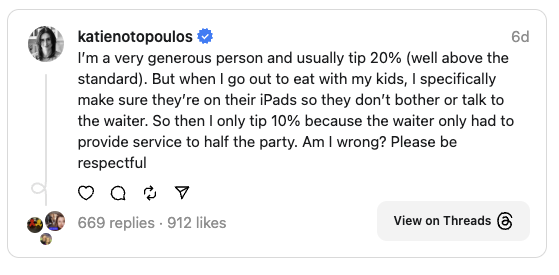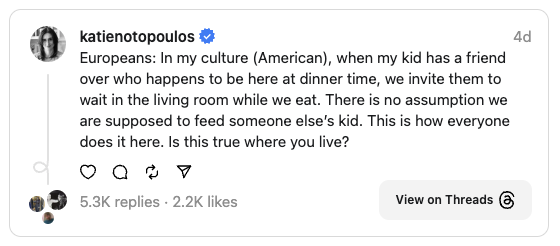Capacities does not support inline editing of Word documents — or any other attachments — and because that is a primary reason I was considering it as an Obsidian replacement, I am far less enthusiastic about Capacities.
Today's ephemera: Oh! The JOY of Heinz Cream of Asparagus Soup!
Today's ephemera: Hangry corgi
My friend Gregory Feeley teaches college. He shared this photo of his classroom whiteboard.

We didn’t even last halfway. The tv has been off for 15 minutes and I can feel my blood pressure subsiding.
Today's ephemera: Sheepdog puppy herds entire flock into owner's kitchen
Here’s some of what I read on Fierce Network during lunch today
An iPhone 16 AI supercycle? Nope, according to analysts. (Dan Jones). I agree — yesterday’s presentation was too long and underwhelming — although if you happen to suffer from one of several health problems that the new gear addresses, the technology could be literally life-changing for you. The AI features were meh and the new iPhones will be great for people who were upgrading already, but won’t win new users.
AT&T’s CEO John Stankey plans to be first and biggest on fiber (Linda Hardesty).
AI is increasing 5G traffic. Signs point toward 6G as the answer (Julia King). tl;dr AI requires a great deal of uplink traffic, overwhelming even 5G.
19 things to love at Vintage Computer Fest Midwest 19 — Liz Coyne went to Vintage Computer Fest Midwest and found a whole lot of fantastic retro technology, including a novelty Kermit the Frog phone, 900-pound IBM mainframe, 1980s era robots and the computer behind Chuck E. Cheese audio-animatronics. Fun!
Today's ephemera: Well, that's not good
libraries aren’t a charity, they’re a public service
…
public libraries exist b/c our societies decided that access to culture, to information, to knowledge, and to a public space that preserves those things is a public good, it’s something everybody should have
public libraries are not and should not be a charity that we only minimally fund b/c some people are too poor to partake in capitalism and therefore need a little handout so they can get smarter to partake in capitalism
— Ami Angelwings urusai.social/@ami_ange…
Trump threatens to jail adversaries in escalating rhetoric ahead of pivotal debate.
The Associated Press, via the Las Vegas Sun:
Trump’s message represents his latest threat to use the office of the presidency to exact retribution if he wins a second term. There is no evidence of the kind of fraud he continues to insist marred the 2020 election; in fact, dozens of courts, Republican state officials and his own administration have said he lost fairly.
Just days ago, Trump himself acknowledged in a podcast interview that he had indeed “lost by a whisker.”
While Trump’s campaign aides and allies have urged him to keep his focus on Harris and make the election a referendum on issues like inflation and border security, Trump in recent days has veered far off course.
On Friday, he delivered a stunning statement to news cameras in which he brought up a string of past allegations of sexual misconduct, describing several in graphic detail, even as he denied his accusers’ allegations. Earlier, he had voluntarily appeared in court for a hearing on the appeal of a decision that found him liable for sexual abuse, turning focus to his legal woes in the campaign’s final stretch.
Earlier Saturday, Trump had leaned into familiar grievances about everything from his indictments to Russia’s meddling in the 2016 election as he campaigned in one of the most deeply Republican swaths of battleground Wisconsin.
“The Harris-Biden DOJ is trying to throw me in jail — they want me in jail — for the crime of exposing their corruption,” Trump claimed at an outdoor rally at Central Wisconsin Airport, where he spoke behind a wall of bulletproof glass due to new security protocols following his July assassination attempt.
There’s no evidence that President Joe Biden or Harris have had any influence over decisions by the Justice Department or state prosecutors to indict the former president.
…
Harris campaign spokesperson Sarafina Chitika responded to his comments with a statement warning that, if Trump is reelected, he will “use his unchecked power to prosecute his enemies and pardon insurrectionists who violently attacked our Capitol on January 6."
…
As Trump was campaigning, Harris took a short break from debate prep to visit Penzeys Spices in Pittsburgh’s Strip District, where she bought several seasoning mixes. One customer saw the Democratic nominee and began openly weeping as Harris hugged her and said, “We’re going to be fine. We’re all in this together.”
Harris said she was honored to have endorsements from two major Republicans: former Vice President Dick Cheney and his daughter, Liz Cheney, the former Wyoming congresswoman.
“People are exhausted, about the division and the attempts to kind of divide us as Americans,” she said, adding that her main message at the debate would be that the country wants to be united.
“It’s time to turn the page on the divisiveness,” she said. “It’s time to bring our country together, to chart a new way forward.”
Trump held his rally in the central Wisconsin city of Mosinee, with a population of about 4,500 people. It is within Wisconsin’s mostly rural 7th Congressional District, a reliably Republican area in a purple state.
During his speech, he railed against Harris in dark and ominous language, claiming that if the woman he calls “Comrade Kamala Harris gets four more years, you will be living (in) a full-blown Banana Republic" ruled by “anarchy” and “tyranny.”
Trump also railed against the administration’s border policies, calling the Democrats’ approach “suicidal" and accusing them of having “imported murderers, child predators and serial rapists from all over the planet."
Many studies have found immigrants, including those in the country illegally, commit fewer violent crimes than native-born citizens. Violent crime in the U.S. dropped again last year, continuing a downward trend after a pandemic-era spike.
A corporate-sponsored speaker came in right after we were ordered to come back to the office to try and boost morale or something. None of the bosses or directors were there, having sent an email that they were working from home, which really ticked everyone off. We gave this speaker a pretty hard time, ignoring him and talking amongst ourselves. His presentations were mostly about why remote work was never going to be the norm and some stuff that was union-bustingly awkward. He tried to get us up and involved with, “Okay, who can stand on one foot the longest! Woo! Let’s get that blood pumping!” My coworker, RJ, is an amputee so he popped his leg off and left it standing, sat back down and dug a novel out of his bag and started to read. RJ is my hero.
— Workplace morale-building competitions gone wrong,, on Ask a Manager
I’m still exploring Capacities, which looks like Obsidian 2.0. Two different products by two different companies, but it seems like the Capacities developers looked hard at Obsidian, learned from it, and improved it.
Capacities uses tags and objects instead of folders, which I hated the idea of, but now I think maybe I just haven’t seen tags done well until now.
The Capacities home page has the usual marketing folderol for notetaking and document management software. It’s a “studio for the mind!” (wow!) “Our computers made us think like them!” (Capacities says that’s bad.) “Folders and hierarchies limit our creativity!” (ok sure whatever if you say so) “Break the silo, create a network of thoughts!” (if we break the silo, where would we put the corn?)
I like the look of Capacities.
Here’s some of what I’ve been reading on Fierce Network lately
The killer app for 5G gets unveiled with iPhone 16. By Joe Madden, principal analyst at Mobile Experts. It’s AI, specifically AI’s need for big, fast uploads. Interestingly, Joe says that the applications for 2G, 3G and 4G were known when the networks were deployed — allowing wired applications to go wireless — but 5G uses are still emerging.
“Peak shaving” could help data centers solve the AI power problem — for now. Diana Goovaerts reports. Data center power consumption comes in spurts, putting a strain on power grids. But “… most data centers have plenty of battery and generator power available on standby as backup power in case the electrical grid goes down. With peak shaving, data centers can just put those existing assets to more active use.” (I achieved peak shaving this morning — new blade.)
The iPhone 16 may cause a surge in demand — a “supercycle.” “’Given the strong consumer interest in AI capabilities, we anticipate a supercycle of upgrades when Apple launches their new devices that will support an embedded Apple Intelligence expected later this year,’ said Rebekah Griffiths, vice president of Product Management and Strategy at Assurant, which collects phone trade-ins and prepares them for resale.’” Monica Alleven reports. I’m skeptical.
AT&T and Verizon aren’t worried about an iPhone supercycle (Dan Jones)
Brightspeed is replacing copper with a unique wireless technology. By Linda Hardesty
And something I listened to: The newly relaunched Five Nines Podcast, hosted by Diana. The introductory episode of the new series focuses on startup Vaire Computing with the ambition of becoming the next Nvidia using technology called “reversible computing” that reduces processor heat generation to virtually zero. CEO Rodolfo Rosini says existing processors are basically heaters that produce compute as a by-product.

Here’s something I saw while walking the dog: A seasonal display of horrors—witchcraft, skeletons and Libertarianism.
It’s been too hot to go out and do anything this weekend, so I’ve been blogging like crazy today and messing around with Capacities.
I’m considering switching to that from Obsidian.
Talk me out of switching. I may need an intervention.
Do you use DevonThink with Obsidian? If so, why?
I’m struggling with my Obsidian setup–I think it’s too complicated.
In addition to Markdown documents, I work with a lot of Microsoft Word documents, PDFs and Web URLs. Until now, I’ve stored all of those in Obsidian – even the Word docs.
Now, I think maybe I’d be better off keeping Obsidian for just Markdown documents and embedded images. Which is how most people seem to use it.
I’m a Mac user, and I know many Mac Obsidian users use DevonThink in conjunction with Obsidian for just the use case I describe. Markdown goes in Obsidian, everything else in DevonThink.
My question is: Why?
The main benefit, as I see it, is that DevonThink gives each document a unique URL, which can then be integrated into Obsidian. But there are other ways to do that, and these ways might be more lightweight than DevonThink:
- Use Hookmark.
- Create a separate Obsidian vault solely for storing non-Markdown reference documents.
- Just use the Mac filesystem and use path links. In this case, you could never move your reference documents from their existing folders, or else you’d break the link.
- Another app like Keep it or EagleFiler, which also serve as document libraries with links to documents, but are lighter weight than DevonThink.
Why do you use DevonThink with Obsidian?
(Perfectly valid answer, but uninteresting for this discussion: “Because I’ve used DevonThink for many years, it works for me, and I see no reason to change.” However, this answer can be made very interesting indeed if you tell us why it works for you.)
Today I learned Carrie Preston and Michael Emerson are married for 26 years. Given the types of characters they play, I am gobsmacked.
Preston’s signature role is as Elsbeth Tascione, a brilliant attorney who presents as an utter ditz—sort of a female Columbo. She played that role on The Good Wife and a couple of its spinoffs.
Emerson plays delicious, sociopathic villains on “Evil” and “Lost.”
Also, now I want to see an Evil/Elsbeth crossover.
Please join me and my colleagues on Monday and Tuesday for the Fierce Network Open RAN Summit, a free virtual event. I’m moderating the panel “Creating New Telco Opportunities in the Cloud with Open RAN” at 12:15 am EST Monday with Neil Coleman, product line management lead, Amdocs, and Rimma Iontel, chief architect, global telco, Red Hat.
A new reminder that Russian interference was never a ‘hoax.’
It just succeeded in a way that Russia could never have predicted.
The recent indictment claiming Russians funneled $10 million to a US-based conservative media company is just the latest example of Russian meddling.
Russians are writing MAGA talking points about how “people of color, perverts and disabled” are infringing “the rights of the White Population of the United States.”
… conservatives self-mythologize as the standards-bearers for deferred gratification and making hard trade-offs, but are utterly lacking in these traits when it comes to climate change and inequality.
— Marshmallow Longtermism, Cory Doctorow @pluralistic@mamot.fr
Conservatives have privilege and money to shield themselves from the consequences of their bad decisions and confidence that situation will last forever.
Seeking maximum ethical benefit from minimum effort.
According to podcaster PJ Vogt, many people who choose veganism do not do so because the animals are killed for human use. These people choose veganism because of the horrible suffering industrial farming puts animals through while alive.
Everywhereist: I Went Paleo and Now I Hate Everything
The supermarket moved things around to different shelves and I’m filing a class action lawsuit.
"We have a damaged, delusional, old man who again might get reelected to the presidency of the United States," Mike Barnicle, who served as a longtime columnist for The Boston Globe and other newspapers…. Trump frequently says “deranged” things in public that “you wouldn’t repeat” on “American television” or “in front of your children.”
” How did we get here?" Barnicle asked. Then he pointed a finger at his media colleagues. “Donald Trump can say whatever crazy things he wants to say, about submarines, and sharks, and electric batteries,” [and] these statements are “not really covered” as a window into “who the man is” or a sign that he’s “out of his mind.”
— Finally: Top Journo Erupts at Media for Ignoring Trump’s Mental State [The New Republic]
Why Would Dick Cheney Endorse Kamala Harris?
Hamilton Nolan:
What unites them is this: a settled commitment to American global supremacy. That is something far more important to Dick Cheney, the human embodiment of the existing global power structure, than a few points on the tax rate or a little more diversity in government hiring. Kamala Harris, in her acceptance speech at the Democratic National Convention, promised that “ will ensure America always has the strongest, most lethal fighting force in the world.” This is enough for Dick Cheney. In this sense, she is a traditional Democrat.
All of us who vote for Democrats need to understand what we are getting. Our feeling of moral superiority on domestic policy—we are the ones against racism and poverty! We are the ones who protect women!—is at all times floating atop an unmentioned sea of weapons pointed at millions of less powerful people outside of our own borders. Republicans are bastards on domestic and foreign policy and Democrats are nicer on domestic policy and very, very close to Republicans on foreign policy. Even among Democrats, the baseline assumption that America must have enough guns to exert our will on the entire world is not questioned. Kamala Harris may push for paid family leave, but she is not going to dismantle the United States intelligence agencies. Kamala Harris may raise taxes on capital gains, but she is not going to meaningfully slash military funding. Kamala Harris may protect abortion, but she is not going to stop sending weapons to Israel, or remove America’s drone bases in Africa, or Give Schools All The Money They Need and Make The Air Force Hold a Bake Sale to Buy a Bomber. The harshest things that America does, its most uncompromising violence, its rawest assertion of pure power over weaker people, is always down overseas, far away from where we can watch it. For generations, there has been a mutual agreement from both major parties to do what must be done to protect America’s ability to militarily dominate the world—the gun that protects our concurrent ability to be richer than everyone else, the velvet fist that allows us to extract trillions of dollars in value from the Global South and use it to raise our own national standard of living. This commitment to maintaining the global order, people like Dick Cheney understand, is more important than all the other, smaller issues that voters get worked up about. This is the tree, not the branches.
It’s not that Donald Trump has any ideological opposition to this commitment, which the Republicans have always embraced with relish. It’s just that he’s insane and an unpredictable egomaniac and therefore cannot be counted on to fulfill his role on this matter.
Today's ephemera: The sun sucks
I have found people’s preferences for hot and cold beverages do not deviate based on the weather.
I’m a hot coffee man. 100 degrees out and the a/c is broken? Don’t care. Bring me my hot coffee.
Similarly, an iced coffee drinker will drink iced coffee during a North Dakota winter.
Today's ephemera: Yipes!
I went to the La Mesa-Foothills Democratic Club event last night, and they had a coffee urn out with the usual fixings. Normally, I am a coffee snob who buys gourmet beans, grinds them at home and drinks it black, but last night I poured a cup of the institutional decaf, added coffeemate and a packet of Splenda, and it was delicious. It was so good that I had two more. I told the organizer that if he had accidentally mislabeled the regular coffee as a decaf, I would give him a call at 3:30 in the morning to let him know.
Trump is telling us that we need to “get over it” about school shootings.
A major podcast network supporting Trump is supported by big Russian money. I’ve seen their alleged talking points – it’s basically the Trump campaign party line.
There are credible allegations Trump took $10M cash from the Egyptian government.
We know he was openly accepting payoffs during his Presidency – it was widely discussed at the time. Even he talked about it.
He’s also an admitted sexual predator. He’s on tape admitting it and those tapes have been widely and publicly played. Around two dozen people said they are his victims. He was sued over it, lost and the judge said he’s a rapist.
He’s a convicted criminal. Dude’s a felon, no different from a guy who sticks up a 7-11.
Add this to his mishandling of the Covid crisis. No matter how serious or trivial you think Covid is and was, you can still look at Trump and say he failed. Either it was a horrible pandemic or a hoax. Either way, Trump failed to protect us.
Also, Trump supports the people who tried to violently overturn the 2020 election results, and murder Nancy Pelosi and Mike Pence. He calls them political prisoners and is hosting a fundraising event for them.
On the other hand, Kamala says she worked at McDonald’s. But it’s not on her resume. So did she REALLY work at McDonald’s?
I can understand why undecided voters are finding this such a difficult decision!
An Informant Exposes The Inner Workings Of The Ku Klux Klan [Fresh Air]
Joe Moore, a former Army sniper turned FBI informant, shares how he infiltrated the KKK and helped foil a plot to assassinate then Sen. Barack Obama. Moore explains how hate groups are growing. His new book is ‘White Robes and Broken Badges.’
Real-Estate Shopping for the Apocalypse
Patricia Marx writes for the New Yorker about her tour of bunkers in which people can survive the apocalypse in comfort.
After weeks of scrolling, I found a handful of dream hideaways on the market whose sellers were willing to let me take a tour. There were two bunkers in Montana, one of which sleeps at least ninety; a prepper bunker in Missouri that features an inconspicuous entrance and a conspicuous arsenal of guns (not included in sale, but makes you think twice before criticizing the kitchen-countertop choice); a defunct missile-silo site in North Dakota; and a twenty-thousand-square-foot cave in Arkansas used by its previous owner to raise earthworms. (Favorite bit of real-estate marketing copy: “The worm room speaks for itself.”)
I compare myself to other people too much. Other people are much better than me at not comparing themselves to other people.
Things I saw walking around Oceanside with a friend
 This artful birdhouse
This artful birdhouse
 Retro-futuristic signage
Retro-futuristic signage
 Beach cabanas
Beach cabanas

This mural
 Sophisticated political discourse
Sophisticated political discourse
 Another mural, in a nice courtyard
Another mural, in a nice courtyard
I went for a walk in Oceanside with a friend, and in the parking lot, there was a long line of tough-looking guys with leathery skin and tattoos waiting to pay. I gave them my lunch money out of force of habit.
Apple needs to stop trying to make HEIC a thing
jwz: “Happy Bell Riots day to all who celebrate.” According to a 1995 Deep Space Nine episode, “one of the most violent civil disturbances in American history” occurs in San Francisco the first week of September 2024.
But:
Even when imagining a dystopia, Star Trek somehow still manages to come up with something that is better than our actual lived reality.

📷 Here’s something I saw while walking the dog.
This car has seen some shit.
📷 This morning while walking the dog, we saw this shih tzu wearing shoes.
Love a dog wearing shoes.

Automattic is moving Tumblr to a WordPress back end — Interesting! There’s currently no mass-market platform for personal blogging. WordPress used to be that, but now it’s a hairy, often difficult-to-use publishing platform. Tumblr has the potential to fill that gap.
Moving to WordPress would be an opportunity to add ActivityPub support, which Automattic talked about doing years ago but hasn’t followed through on. I’d also like it if they fixed Tumblr’s broken RSS feeds.
Writing prompt: “A loving, married couple wake up one day to find that they have returned to their high school days, when they were the most popular student and the class geek." Enjoyable flash fiction.
Every time I pop open the self-view when I start a video meeting, I look like I just came off a Sterno and methamphetamine bender.

Charles Stross: "They don't make readers like they used to"
Meaty, thought-provoking post on how the act of reading genre fiction has fundamentally changed since he and I were young.
… the public understanding of fiction itself is changing, and with it, the types of fiction which are commercially (or even socially) viable going forward.
Three fictive seeds germinated during the 1970s, and we’re now living in the fifty year old forest they gave rise to. Forests coevolve with ecosystems, and now we’re seeing the consequences.
Those seeds were: Dungeons and Dragons (which sparked the whole field of Role Playing Games, which constitute a wholly new mode of fiction in which the story emerges through a collaboration between the GM and the players–the GM provides guidelines and mediates between the player characters and their environment, but doesn’t dictate their lines): computer games (which are similarly interactive, but the map or procedural generative content is established before the players arrive): and the first of the big superhero movie franchises (notably the original Christopher Reeve Superman movies, which, starting from 1979, dragged Superman–and then the rest of the DC universe, with Marvel in its wake, out of the comic books and onto cinema and TV screens).
I was an English major in college in the early 1980s, and then it was breathtaking, revolutionary and controversial to suppose that the author was not the ultimate authority on their own work — that readers and authors were coequal creators. Only the greatest minds of literary analysis were capable of comprehending that rarified thought, and many considered it blasphemy.
Now, the idea is commonplace, and every 14-year-old fan is just as great an authority on the Marvel Cinematic Universe as Kevin Feige.
The transitions in the art of genre reading might go a long way to explaining why 99% of the sci-fi and fantasy being published today just bounces off me. Even the award-winning stories. Maybe even especially those. I fail to connect with them. And yet, when I was a teen, I consumed science fiction voraciously.
(Does anybody under 60 even remember Theodore Sturgeon anymore? Poul Anderson?)
The Harris-Walz tech policy platform is still bad
Mike Masnick at Techdirt:
It’s not batshit crazy, like the GOP plan, but it’s still generally bad. It’s the kind of thing that is going to lead to a lot of wasted time and effort as moral panic know-nothing “we must do something” types push out bad idea after bad idea, while people who actually understand how this stuff works have to do our best to educate against the nonsense.
The Arkansas Supreme Court upholds rejection of abortion rights petitions. Just keep digging, Republicans.
To infinity — and beyond! Nokia to extend 4G wireless to the Moon. My colleague Dan Jones reports.
After deciding he is the arbiter on who is truly Black, Trump now gets to decide who’s truly Jewish.
… history does not offer positive stories about political leaders who decide that they can evaluate the legitimacy of Jewish people and their families, suggesting that those who fail the evaluation should be cast out.
Trump is hosting a fundraiser for domestic terrorists who assaulted cops on Jan. 6
Michael Fanone, a former Washington, D.C., police officer who suffered a heart attack after being repeatedly tasered by one of Trump’s followers on Jan. 6, said Americans cannot afford to forget what happened that day. “Wake the fuck up, America,” he told HuffPost. “This is who Donald Trump is, a sick motherfucker who fetishizes violence committed on his behalf.”
I’d like to read Robert E. Howard. I sneered at those books and their fans during my prime teen science fiction and fantasy reading years. But I was so much older then — I’m younger than that now.
Also, today I learned that the Cimmerians were real.
… the business world has a well-worn playbook that they roll out whenever anything that might cause industry to behave even slightly less destructively is proposed. What’s more, we keep falling for it. Every time we try to have nice things, our bosses – and their well-paid Renfields – dust off their talking points from the last go-round, do a little madlibs-style search and replace, and bust it out again.
— Cory Doctorow @pluralistic@mamot.fr, Corporate Bullshit
Court to cop: Someone observing all the laws is not “probable cause” for a search.. By Tim Cushing at Techdirt.
Tim Cushing at Techdirt: Age verification laws are just a path towards a full-on ban on porn, a proponent admits.
Mask bans disenfranchise millions of Americans with disabilities. Medical exemptions are nothing more than Band-aids
I’ve been masking consistently in public since 2020, when the Covid-19 pandemic began, because I have a kidney transplant and will take immunosuppressant medication for the rest of my life. Unfortunately, my lifesaving medication also makes me more susceptible to infectious diseases like measles, the flu, and Covid-19. Even when people like me are vaccinated against the virus, we are at higher risk of being infected and are more likely to experience adverse health outcomes, including hospitalization and death.
The legislation in Nassau County and elsewhere primarily targets people who wear masks to hide their identity while committing crimes or during public protests, specifically against the ongoing genocide in Palestine. Masks are defined as any facial covering that disguises the face, and facial coverings worn for religious or health reasons are exempt. But people like me, who wear masks for health reasons, are disproportionally affected by these bans even when they include medical exemptions.
That’s because although the Nassau mask ban contains provisions for people who mask for medical reasons, it is up to the police to determine whether someone has a medical reason for masking if they are out in public. This means that enforcing the ban is subjective and will disproportionally impact Black people and people of color, who are more likely to be stopped by police and are also more likely to wear masks to prevent Covid. This is in part because Black and Latinx Americans are more cautious in their approach to the pandemic, reflecting the higher hospitalization and death rates in these communities. The Nassau mask ban as it is written is reminiscent of a “Stop and Frisk” law, which allows police to temporarily detain, question, and search people without a warrant.
This isn’t just localized to Nassau County; mask bans have been proposed or passed in multiple states, including North Carolina, Ohio, and California.
Mike Masnick at Techdirt: Ad revenue at Twitter is still in free fall two years into Musk’s reign.
Karl Bode at Techdirt: Now that streaming subscriber growth has slowed, streamers are “falling into all of the bad habits that ultimately doomed traditional cable TV.”
Disney’s CFO says the company has “earned” the right to relentless price hikes.
Do you want piracy? Because that’s how you get piracy.
I just saw the GOP referred to as “period-tracking panty-sniffing ghouls” and that is perfect. No notes.
Where are you watching the Democratic National Convention? I’m looking for a TV station or streaming channel where the pundits don’t talk over the speakers.
“Disenshittify or die! How hackers can seize the means of computation and build a new, good internet that is hardened against our asshole bosses’ insatiable horniness for enshittification.” — Cory Doctorow at Pluralistic
What Happened to Getting a Doctor’s Finger in Your Butt?
It’s a rite of passage for men. You’re in your 40s, you’re at your annual checkup, and suddenly you hear the snap of a rubber glove.
Why doctors are no longer doing the digital rectal exam (DRE).
You’ve got to hide your myopia away: John Lennon’s contact lenses
John Lennon’s eyeglasses became iconic, but before 1966 he was seldom seen in public wearing glasses. Instead, he wore rigid contact lenses that frequently fell out.
This is a wild article from the professional/scientific “Journal of the College of Optometrists.” It goes deep on medical terminology, attempting to diagnose Lennon’s prescription and explaining why he had such problems wearing contacts.
Nigel Walley, John’s childhood friend and manager of John’s first band ‘The Quarrymen’ (which evolved into The Beatles) recalled: ‘The thing with John though was that he was as blind as a bat—he had glasses but he would never wear them. He was very vain about that’ ‘He didn’t want to be seen out in them, and kept them in an inside pocket along with his mouth organ. He might slip them on to see something, but he’d whip them off again very quickly’.
In 1980, John himself explained that ‘I was just a suburban kid, imitating the rockers. But it was a big part of one’s life to look tough. I spent the whole of my childhood with shoulders up around the top of me head and me glasses off because glasses were sissy…’.
Paul McCartney recounted a story of John’s spectacle wearing habits from their teenage years in Liverpool. ‘He was pretty short-sighted, and it led to some funny occasions… Normally if there were girls around, he’d whip them off. He was a little bit shy with them, so if he was out and about, he’d just take them off… But he came down to my house, he lived about a mile or so away… We were writing some stuff and we got finished about midnight.
And so… he took off his glasses and walked home. The next day he said “…do you know those people on the corner of Booker Avenue?” I said ‘Yeah’. He said, ‘They’re crazy… at midnight when I left you, they were out on the porch of their house playing cards’. I said, ‘You’re kidding me’. So, I had to investigate. I went around and had a look… it was a nativity scene’.”
Chicago officials have been terrified that Texas Gov. Greg Abbott would inundate the DNC with migrant buses. But the people of Chicago may have already called Abbott’s bluff.
This is not the optimistic article suggested by the headline and description. Today’s broken immigration policies are creating a crisis and misery that will roll on for many, many years.
Quixotic attempts to seal the border, combined with prison camps to hold tens of millions of people, won’t solve the problem. They’ll just accelerate the crisis and make it a million times worse.
“I killed him for money – and for a woman. I didn’t get the money. And I didn’t get the woman.” Roger Ebert reviews “Double Indemnity.”
The “Memindex Method” was a 1906 precursor to the Bullet Journal, Hipster PDA, GTD and related productivity systems. It preceded Vannevar Bush’s seminal “memex” essay by nearly a half-century.
Here’s something I saw immediately after walking the dog.

11 years old. Still gets zoomies.
Many "ews" were said
Last night, Julie went into the pantry to get a snack. She found a pound and a half of sliced deli turkey breast that had gotten lost on the path from the supermarket to the car to the refrigerator.
This explains the unpleasant smell and flies that had been lingering inexplicably in the kitchen for weeks.
Many “ews” were said that night, and the turkey found its way out of the house and into the trash bin. Fortunately, trash pick-up was this morning.
As a pleasant surprise, the smell and flies were gone almost immediately.
Scott Dworkin: The press must cover Trump’s cognitive decline.. Tom Nichols at The Atlantic: “Trump’s “obvious emotional instability is frightening, not funny.”
A friend said one of my earlier posts about Trump was fat-shaming. Not sure he’s right, but I amend the word “obese” to “with an unhealthy lifestyle.”
Articles I read over lunch today on Fierce Network: Brightspeed’s multi-billion-dollar cash infusion, US and Sweden team on 6G, and Huawei looks to beat Nvidia chips
Brightspeed gets a whopping $3.7 billion to build fiber networks. Linda Hardesty breaks the news.
The US and Sweden are teaming up to develop 6G technology. By Dan Jones
Natural gas companies want to power artificial intelligence. Nuclear power won’t arrive fast enough. By Diana Goovaerts.
Investors are pouring money into hardware to secure sufficient compute power for AI. By Diana Goovaerts
Huawei is developing a new chip to challenge Nvidia and surmount US sanctions
Alert readers will note that last article is not from Fierce Network.
ChatGPT updated to new model based on user feedback — Release notes? OpenAI has heard of them.
Donald Trump is a 77-year-old obese man who is clearly losing his mental faculties. He can’t even remember who he’s running against half the time or remember her name even when he does. What happens when his decline is obvious even to his supporters? Or if he drops dead? What if that happens before Election Day?
An enjoyable, informative but unsatisfying read. Bouie concludes that the party will still be Trump’s as long as he wants it.
Andy Borowitz: Trump and Musk Share Tips on Running Companies into Ground
Trump is starting to give off “All right, Mr. DeMille, I’m ready for my close-up” vibes. via
Trump is accelerating AI-driven truth decay
Ina Fried at Axios AI+: AI’s biggest danger isn’t that it can be used to make up lies — human beings are already great at lying. It’s that bad people can claim that inconvenient facts are AI-generated deepfakes.
Many people saw big crowds at Harris rallies, but Trump claims the photos and videos were manufactured by AI.
Warnings about the danger of deepfakes have helped arm the public against an expected flood of fakery.
- But they’ve also unavoidably made it possible to question the trustworthiness of any evidence you don’t like.
- The next time a recording surfaces of some private event where a politician said something damaging, it will be that much easier to deny it.
Some Jan. 6 defendants tried to argue that photos showing them attacking the U.S. Capitol were AI-generated fakes, invoking what a recent American Bar Association article calls “the deepfake defense.”
- “The growing use of AI-generated false and misleading information is exacerbating the challenge of the so-called liar’s dividend, in which widespread wariness of falsehoods on a given topic can muddy the waters to the extent that people disbelieve true statements,” a Freedom House report last year argued.
…
- A world in which nobody trusts anything is one where autocratic leaders can easily mobilize hate and invent their own realities.
The bottom line: As Yale historian Timothy Snyder, author of “On Tyranny,” puts it, “What authoritarians do is they say, ‘Look, there’s no truth at all. Sure you don’t trust me – but don’t trust them, or them, or certainly not the media. Don’t trust anybody.'”
- “And so just stay on your couch, basically … just do nothing. Affect a pose of cynicism. Be equally skeptical about everything.”
An appreciation for the under-appreciated, brilliant sci-fi writer John Varley.
Timothy Sandefur at Discourse Magazine:
It was 50 years ago this month that American science fiction writer John Varley – who celebrates his 77th birthday today–published his first short story. It sparked a rapid rise that brought him the praise of the genre’s most prominent figures, along with multiple Hugo and Nebula awards (the science fiction equivalent of the Pulitzer). Isaac Asimov was among the many who called him the natural successor to Robert A. Heinlein.
Yet despite the immense admiration Varley has enjoyed both within the science fiction community and without (Tom Clancy called him “the best writer in America”), he has never gained the following that Asimov or Heinlein enjoyed. That’s a shame because his unique blend of imagination and realism–and his underlying belief that freedom is essential to the human personality–make him one of the finest authors ever to set his fiction in the future….
Varley moved to San Francisco as a young man, and the “hippie element” plays an important role in his fiction, “not (or not usually) in the sense of ‘tune in, turn on, drop out,’ but of rebellion, self-reliance, hard work and creativity that remain underappreciated elements of the ’60s counterculture.”
Contrary to the popular stereotype of hippies as drugged-out, unemployed hitchhikers, many members of the Woodstock generation (Varley attended Woodstock, by accident, after getting stuck in the traffic jam while driving through New York) put a heavy emphasis on manual trades, intellectual innovation and self-improvement. Many members of the counterculture weren’t anti-capitalist per se, but were committed to what historian David Farber calls “right livelihood”: that is, a life of genuineness not offered by what they called “the Establishment.”
Disappointing: Confess, Fletch director Greg Mottola says the series “curse” got him and no sequel is currently planned. I very much enjoyed the Jon Hamm movie that came out two years ago and would gladly have watched a sequel every year for the rest of my life.

Ericsson is working with partners to supply private 4G and 5G networks to US rural electrical cooperatives “of all sizes and service terrains.” My colleague Dan Jones reports on Fierce Network.
“Peggy Sue Got Married” for 2024. I like it.
For a research report, I’m looking for companies outside the tech industry that are doing interesting work with artificial intelligence. If that’s you, or if you have any leads, email me at mwagner@questex.com.
Anil Dash: The purpose of a system is what it does
Dash: Unlike physical machines, the institutions that make up society are never broken. They always do precisely what they were designed to do.
… when our carceral system causes innocent people to be held in torturous or even deadly conditions because they could not afford bail, we must understand that this is the system working correctly. It is doing the thing it is designed to do. When we shout about the effect that this system is having, we are not filing a bug report, we are giving a systems update, and in fact we are reporting back to those with agency over the system that it is working properly….
In my own life, I’ve found the greatest reluctance to embrace this idea, and strongest rejection of its obvious truth, comes from the politically moderate, centrist-leaning suburban folks…. “
Accepting the principle of POSIWID is “a prerequisite for optimism that actually has impact. Mindless optimism says, ‘this system is supposed to have a good output, therefore if we support it hard enough, it’ll do the right thing.’”
Kid Rock Threw the Party. MAGA Faithful Brought the Joy, Rage and Smirnoff Ice..
A music festival headlined by the pro-Trump musician offered a snapshot of a maturing American subculture, with a mash-up of hedonism, rebellion and beer-guzzling pursuit of happiness.
Frank Zappa was a musical genius and a difficult father. His four children, now in their 50s, are still grappling with his legacy; Dweezil doesn’t even talk with the others.
Canadian sci-fi writer Robert Sawyer has released a free version of the venerable WordStar word processing program
The app includes a DOS emulator so it can run on modern Windows, and Sawyer says it also supports Mac and Linux, according to Lia Proven at The Register.
WordStar users include Sawyer, who’s still using it, as well as Arthur C. Clarke, Anne Rice, George R. R. Martin (who still used it as of 2014), William F. Buckley Jr. and Ralph Ellison.
Sawyer’s project may be illegal — he declared WordStar to be abandonware but it may still technically be somebody’s intellectual property.
I was more of a XyWrite guy. I wonder whether there’s a version that runs on the Mac?
Facebook has decided I want to get notifications anytime somebody posts to any of the dozens and dozens of groups I’m a member of. Spoiler alert: I do not want to receive these notifications.
I have asked Facebook to change the name of the page I manage. Apparently, I have to ask for permission to change the page’s name? Because I’m five years old and Facebook is my auntie?
Facebook is such a shitty platform.
I think I may have figured out how to turn off Facebook notifications when someone reacts to one of my posts. If it works, this would make Facebook a million times friendlier.
TimWalzFixedYourBicycle.com. I’m just going to refresh that the rest of the day.


